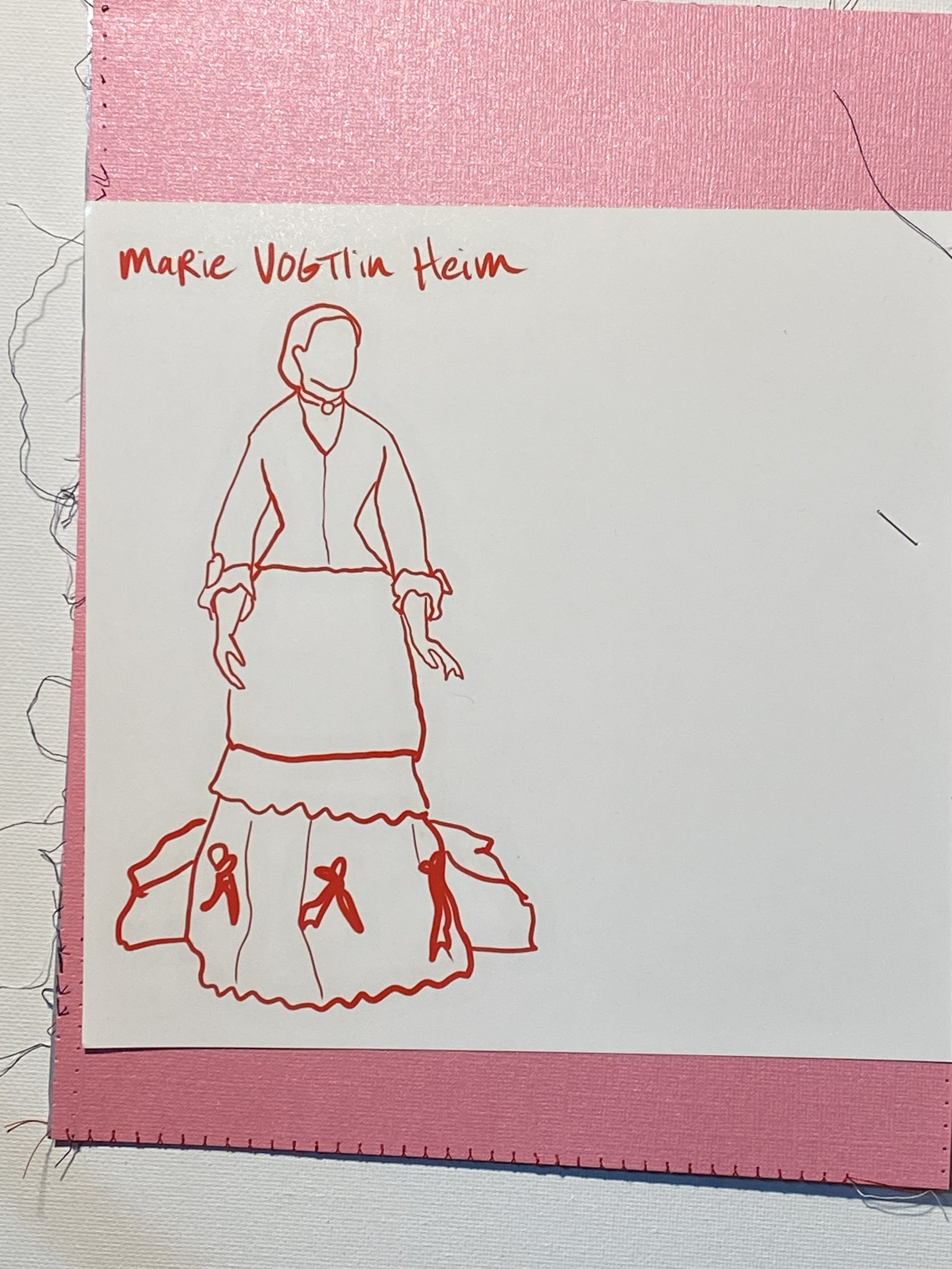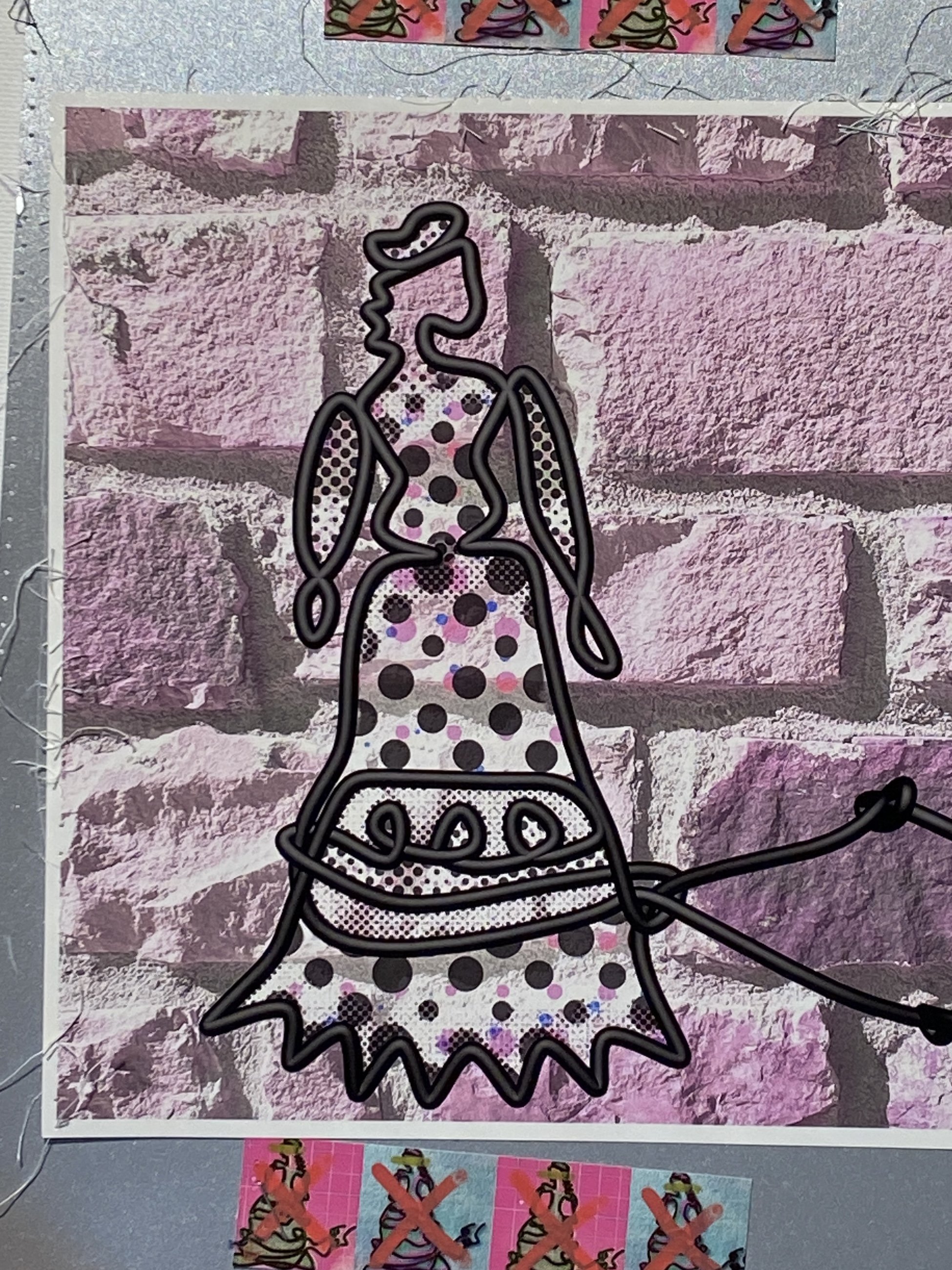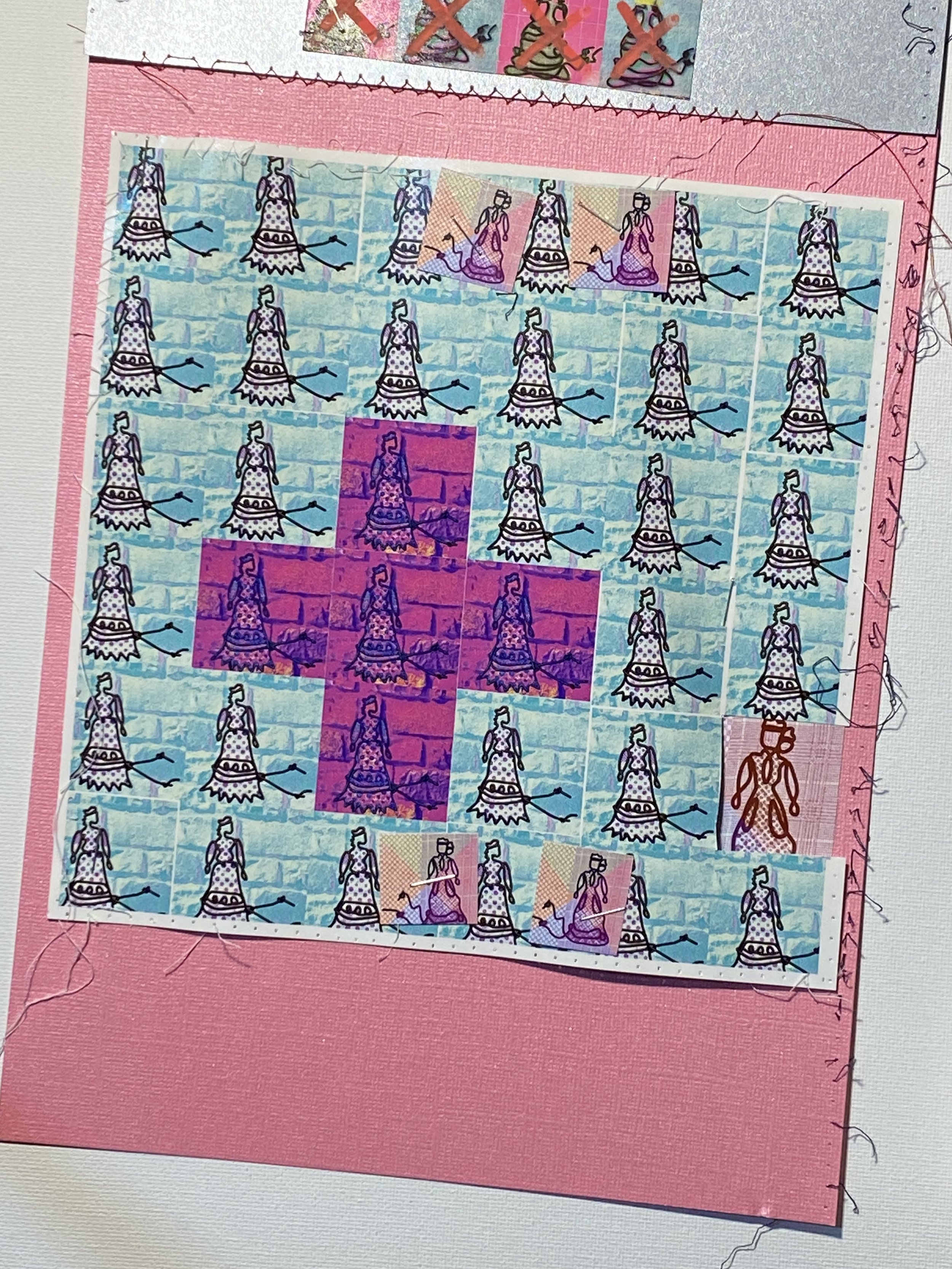
Marie Vogtlin
Dr. Marie Heim Vogtlin
Zurich
MD 1874 (1868-1874)
Ueber den Befund der Genitalien im Wochenbett
Thesis: On the Findings of the Genitalia in the Postpartum Period.
From The Biological Dictionary of Women in Science
Swiss physician.
Born 1845 in Aargau, Switzerland, to Henriette (Benker) and Pharrer Julius Vogtlin. Married ALbert Heim.
Educated by her parents; Herrnhuter Institute Montmirail bei Neuenburg; University of Zurich (1868-1874; doctorate 1874).
Professional experience;
Brugger Kinderhospital, assistant;
Armenschule, assistant;
Leipzig and Dresden, assistant physician (1874 -?);
private practice for women and children, Zurich; participated in the opening of the Zurich Women’s Hospital (1901).
Died 7 November 1916 in Zurich.



Marie was from Switzerland, the first local woman to consider medical school. Ironically, because of this, she faced greater obstacles than the other women. Foreign students were not required to meet the admission standards of Swiss students, they only required a letter of reference. To gain admission to school, Marie had to pass the school exam offered only to boys finishing high school (aka the Gymnasium). The other challenge Marie faced was the public’s reluctance to accept a women doctor as their own. The foreign women wanted to practice medicine in their own countries after graduation, Marie wanted to practice medicine in Switzerland. Critics raised the typical complaints, saying she lacked the temperament and physical strength, she was unsuited to study alongside men, and she was abandoning home and hearth to pursue a man’s vocation.
-
At the age of 24, shortly after beginning her medical studies, Marie Heim-Vögtlin wrote the following lines to a friend:
... a thorny path, full of difficulties. But none of them are insurmountable; I want to overcome them all...
It was 1867, and these were the words of the first Swiss female medical student.
Marie Heim-Vögtlin’s career aspirations caused a public stir: even the newspapers reported on her plans. The young woman had to endure a lot of sarcasm and ridicule.
Marie Heim-Vögtlin grew up as the daughter of a pastor in a conservative environment. She received a refined education for girls from private tutors. As a young adult, she initially followed the traditional path of middle-class women of her time: she managed the household for her widowed father and kept herself entertained with reading and walks. However, the pastor's daughter felt that cooking, sewing, playing the piano, and writing letters were not challenging enough. She used every free minute to study Latin and mathematics books, secretly preparing herself for university.
It was exceptional for that time that her conservative father not only tolerated his daughter’s aspirations but also significantly supported her. Thanks to his signature, Marie Heim-Vögtlin was eventually admitted to the University of Zurich.
In 1865, Nadezhda Suslova from Russia came to Zurich to study medicine after being barred from university studies in St. Petersburg because she was a woman. Suslova created a precedent: a majority of the liberal-minded professors at the University of Zurich prevailed against a fiercely fighting minority. Suslova was allowed to take her exams in 1867, marking a milestone for women's education. Zurich became the first university in the German-speaking world to officially open its doors to women.
Harsh Rejection
Two years later, Marie Heim-Vögtlin began her medical studies as the first Swiss woman. After completing her state exams, she spent a semester in Leipzig for further education. In her letters to a friend, she reported facing harsh rejection and harassment from fellow students.
Back in Zurich, she wrote her dissertation, On the Findings of the Genitalia in the Postpartum Period. On July 11, 1874, she became the first Swiss woman to pass the doctoral exam at the University of Zurich. It was a memorable day in the history of women's education.After her doctorate, Marie Heim-Vögtlin opened a practice on Hottingerstrasse in Zurich. Consistent in her attitude, she did not give up her professional work even after the birth of her children. Together with her husband, Alfred Heim, a professor of geology, she led a marriage that was modern by today’s standards.
In addition to her practice, Marie Heim-Vögtlin was also involved in the professionalization of nursing at Switzerland’s first school for nurses. She advocated for women’s suffrage and was active in the temperance movement.
In 1914, a serious illness forced Marie Heim-Vögtlin to scale back her professional activities—a difficult step for someone who was so tirelessly active. Despite numerous stays at health resorts, her condition worsened. Switzerland’s first female doctor died on November 7, 1916, at the age of 70, from tuberculosis.
—Sandra Küttel, Press and Information Service of the Bern Medical SocietyLiterature:
MÜLLER, VERENA E.: Marie Heim-Vögtlin – The First Swiss Female Doctor (1845 to 1916): A Life Between Tradition and Change. Verlag Hier+Jetzt, Baden: 2007.





“let a few foreign women be so shameless and study, a Swiss woman should not and must not.”
1867
In a very Legally Blond Moment, she lost her fiance to another woman. He was a medical student at the university alongside one of the first women to formally enter medical school. He got to know Nadezhda and broke off the engagement with Marie. After the breakup she was determined to become a physician.
(he marries Nadezhda the following year, they divorce a few years later)
At first, Marie’s father was supportive of her endeavor, but quickly retreated in the face of strong opposition. Family, the community and eventually the entire nation were against Marie. The backlash lead him to finally consent and support his daughter in the battle. The university admitted her with no hesitation in Fall 1868.
“I want to break new pathways, will I succeed? The responsibility I have taken on myself is great. I feel that I stand here in the name of my entire sex and if I do poorly I can become a curse to my sex.”
-
The aftermath of the breakup with Friedrich was tumultuous, to say the least. Determined to forge my own path, I made the bold decision to pursue a career in medicine. Initially met with reluctance from my father, his support wavered in the face of strong opposition from our family and community. It was a bitter contest, one that soon erupted into a national outcry.
However, despite the obstacles and the weight of societal expectations, my father eventually relented and stood by me in my pursuit of higher education. The university, a bastion of liberalism in a conservative era, welcomed me without difficulty in the fall of 1868. The sense of responsibility weighing upon me is immense. I am acutely aware that my journey is not just about personal ambition but about breaking new pathways for women like myself.
In a letter to a friend, I poured out my hopes and fears. Will I succeed in this endeavor? The responsibility I have taken upon myself is great, for I feel that I stand here not just for myself, but for my entire sex. Failure is not an option, for to falter would be to become a curse upon my gender.
-
Today, I find myself reflecting on the challenges that lay before me as I embark on my journey to become a physician. As the first Swiss woman daring to pursue medicine in my own homeland, I face obstacles that seem insurmountable. Unlike my foreign counterparts, I am held to a higher admission standard, and my desire to practice medicine in Switzerland itself is met with skepticism and resistance.
Critics echo sentiments heard in distant lands, questioning my temperament, physical strength, and suitability for a profession deemed reserved for men. They argue that I am abandoning my rightful place in the home to pursue what they consider a man's vocation. It is disheartening to hear such sentiments, as if my dreams and ambitions are somehow less valid because of my gender.
Born into a conservative farm town in Arrgau, I was raised in a family that valued books and education. At seventeen, I was engaged to Friedrich Erismann, a man who encouraged my intellectual and political interests. However, following the breakup of our engagement, I resolved to pursue my passion for medicine, despite the societal pressures and expectations placed upon me.
It is a daunting journey that lies ahead, but I am determined to defy the odds and prove that a Swiss woman can indeed excel in the field of medicine. With courage and determination, I will strive to overcome the obstacles that stand in my way and pave the path for future generations of women.
-
The workload at the university is proving to be challenging, but contrary to expectations, I find myself thriving. Soon after my arrival, I begin to forge friendships with fellow students, including Dimock, Forel, and Bokova. The reception I receive fills me with ecstasy. The rector is like a guardian angel to me, and the professors are all extremely friendly. What warms my heart even more is how decently the male students treat the women.
In the midst of my studies, I have the pleasure of meeting Albert Heim, a future geology professor, who will later become my husband after my graduation. But it is my relationship with Miss Dimock, whom I now call my faithful companion, that truly deepens. We make plans to visit my family and hike in the mountains over the holidays. Together, we confide in each other, sharing our hopes and fears. Dimock and I are probably the best in the entire anatomy class, a fact that brings us both pride and solidarity.
The parting between Dimock and me upon her completion of her studies in 1871 is painful beyond words. It feels like a part of me is dying, for we may never see each other again. However, I take solace in Dimock's success in her examination for the medical degree. She ably defends her thesis under the gynecologist Adolf Gusserow, earning praise for her energy and steady persistence.
It is heartening to see women like Dimock breaking barriers and proving that it is possible for us to excel in the field of medicine without losing our female character. I am grateful for the support I receive from my colleagues and mentors, especially the male students who have helped smooth the way for their female companions.
-
Shortly after my arrival in Zurich, fate intervenes in a most unexpected way. I meet Albert Heim, a future geology professor, who will later become my husband after my graduation. Little did I know then that our paths would intertwine so closely, leading to a lifetime of shared dreams and aspirations.
In Zurich itself, I make history as the first woman in my country to be allowed to practice medicine. The journey is arduous, but the satisfaction of breaking new ground fills me with immense pride. Despite the demands of a very large practice, I find fulfillment in raising three children alongside my beloved Albert. Together, we navigate the joys and challenges of parenthood, cherishing each moment as a precious gift.
But my contributions extend beyond the confines of our home. I play a pivotal role in founding a nursing school and take charge of the children's ward at an associated hospital. Through these endeavors, I hope to make a lasting impact on the healthcare landscape of Switzerland, ensuring that future generations receive the care and compassion they deserve.
In time, I become one of the best-known citizens of Switzerland, a testament to the resilience and determination of women like myself who dare to defy convention and carve out their own destinies.
1871
Marie was heartbroken when Susan Dimock graduated, they may never see each other again (they probably didn’t). Marie must have felt terribly alone even while surrounded by the large number of Russian women arriving at the university.
1872
WHAT HAPPENED IN 1872 WHY WAS EVERYONE IN VIENNA…
One Russian arrived in Zurich - Adelaide Lukaniana, she will go on to study in the US read more about her life through the link below
Another Russian must be there - Nadezhda Shumova arrives in Zurich with her brother in law Nikolai Ivanovich Ziber who married the much younger sister (this sounds like another Kovalevskaya Situation (See Sofya Kovalevskaya and her “marriage”)
1873
By May there are 153 Russian students in Zurich, 103 were women, the vast majority were attending the medical school. They were motivated by a variety of reasons
Equality of the sexes
Financial Independence
Serve Humanity
Tend to the peasants of their Estates
now, more than a hundred women had migrated to Zurich to study, the large majority of them were Russian.
P. Jakovieva and M. Pruzanskaja are two Russian students who complete their degrees this year according to the notes from Knowledge and Revolution
1874
She was the last to finish school, Marie entered the university with the least experience and no previous training, therefore was the last to graduate. Louisa Atkins and Eliza Walker finished their degrees in 1872.
After completing her coursework, Marie studied in Leipzig where she found the German students to be “repulsive” with loud and insulting behavior towards women. She went on to Dresden working under gynecologist Franz von Winckel, a supporter of women’s education.
This was the year the Imperial ukaz attacked the morality and political loyality of the Russian women students in Zurich, ordering them to leave their studies and return home to the Women’s Medical Courses being established [TFM, 7].
July
Marie returned to Zurich to defend her thesis in the same room as her female predecessors (except for Frances Morgan when the crowd couldn’t fit in the room).
“The responsibility I have taken on myself is great. I feel that I stand here in the name of my entire sex and if I do poorly I can become a curse to my sex.”
She passed.
1875
Married Albert Heim
With respect to Albert - find out more about his future faculty member Marie Brockmann-Jerosch who is listed as assistant to Professor Albert Heim.
1916
died of lung disease
Translated text below:
(Translated from German using Google Translate)
Feb 2008 publication of the Medical Association of the Canton of Bern along with the Medical Society of the Canton of Bern:
Dr. Marie Heim-Vögtlin (1845–1916) was the first Swiss female physician to lead a life between tradition and modernity. A recently published biography by historian Verena E. Müller sheds light on the hurdles this woman had to overcome.
Shortly after beginning her medical studies, 24-year-old Marie Heim-Vögtlin wrote the following lines to her friend: "... a thorny path, full of difficulties. But none of them is insurmountable, I want to overcome them all..." The year was 1867, and these lines were written by the first Swiss female medical student. Marie Heim-Vögtlin's career aspirations caused a public stir: Even the daily newspapers reported on her plans. The young woman had to endure much sarcasm and ridicule.
Marie Heim-Vögtlin grew up as the daughter of a pastor in a conservative environment. She enjoyed a solid education for girls from private tutors. As a young woman, she initially followed the traditional path of middle-class women of her time: She took care of the household for her widowed father and entertained herself with reading and walks. However, the pastor's daughter felt that cooking and sewing, playing the piano, and writing letters weren't challenging enough. She used every free minute to work through Latin and mathematics textbooks, secretly preparing for university entrance exams.
The fact that the conservative father not only tolerated his daughter's endeavors but also gave them substantial support was unusual for the time. Thanks to his signature, Marie HeimVögtlin was finally accepted into the University of Zurich.
In 1865, the Russian Nadezda Suslowa came to Zurich to study medicine. This after she had been barred from university studies in St. Petersburg as a woman. The Russian set a precedent: a majority of the liberal-minded lecturers at the University of Zurich prevailed over a bitterly fighting minority.
Suslowa was admitted to the exam in 1867. This was a milestone for women's studies: the University of Zurich had thus become the first university in the German-speaking world to officially open itself to women.
Two years later, Marie HeimVögtlin became the first Swiss woman to study medicine. After her state examination, she spent a semester in Leipzig for further training. In her letters to her friend, she recounted the rude rejection and insults she experienced from her fellow students. Back in Zurich, she wrote her dissertation, "On the Findings of the Genitals in Childbed." On July 11, 1874, she became the first native to receive a doctorate from the University of Zurich. A memorable day in the history of women's studies.
After receiving her doctorate, Marie Heim-Vögtlin opened a practice on Hottingerstrasse in Zurich. Consistent in her approach, she did not give up her career even after the birth of her children. She and her husband Alfred Heim, a professor of geology, had a marriage that was modern even by today's standards.
In addition to her practice, Marie Heim-Vögtlin was also committed to the professionalization of nursing at the first nursing school in Switzerland. She advocated for women's suffrage and was active in the temperance movement.
A serious illness forced Marie Heim-Vögtlin to take a step back from her career in 1914. This was a difficult step for the tireless worker. Despite numerous stays at health resorts, her condition continued to deteriorate. The first Swiss female doctor died of tuberculosis on November 7, 1916, at the age of 70. Sandra Küttel,
Press and Information Service of the
Bern Medical Association
References:
MÜLLER, VERENA E.:
Marie Heim-Vögtlin – the first Swiss female doctor (1845 to 1916). A life
between tradition and new beginnings. Publisher Hier+Jetzt, Baden: 200